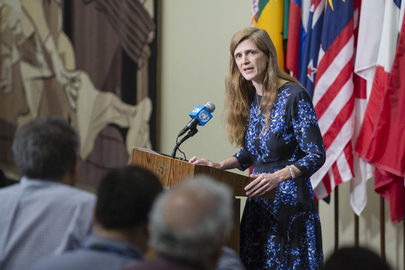On Thursday 26 May, U.N. special envoy for Syria, Staffan de Mistura, briefed the Security Council via Tele-Conference from Geneva , informing them of his intention to start the next round of talks “as soon as feasible, but certainly not within the next two/three weeks,” his office released in a statement.
Staffan de Mistura briefed the 15-member body of his intentions to keep talks open with the Syrian parties and with the International Syria Support Group- comprising of 18 countries, including the United States and the Russian Federation and in coalition with the European Union, and the Arab League- which is working on alleviating the need for humanitarian aid to the region.
This latest initiative to bring negotiations between Syria’s fractioned parties comes after a failed attempt at ceasefire, resulting in high level collateral damage caused in some parts of Syria, particularly in Aleppo.
De Mistura noted that in order for any kind of air drop to be successful, it would need the continued cooperation of the government of Syria, stating that “the government of Syria has cooperated happily” in regards to previous air drops which provided sustenance to thousands of people on the ground.
However, even with the approval of the Syrian government to allow for this humanitarian aid to enter, there have been numerous problems in actually reaching the locations, if any people at all. Certain areas have had limited access, rendering the situation even more critical, as children especially have fallen victims of malnutrition.
“We are still failing the people of Darayya, as we are failing the people of Moadamyia and Al-Waer,” stated Jan Egeland, senior advisor to de Mistura. “Those are indeed three places, I would say, that the situation is still horrendously critical.”

The possibility of food scarcity has become a key initiative for the UN humanitarian aid, with de Mistura noting that the World Food Program (WFO) provided “excellent work” in preparing concrete plans for any possible delivery. The agencies were hoping to reach two million children through their efforts, with 1,400 teams prepared to reach this goal.
De Mistura’s advances, however, have been met with criticism and frustration from different countries, particularly the United States. U.S. ambassador to the U.N. Samantha Powers stated these frustrations and called out Russia for its support of the Assad regime, stating “Russia has special responsibility to press the Assad Regime to abide by cessation of hostility and end its bombardment and siege of innocent civilians”.
Just last week, Russia criticized the Unites States and its allies for not joining in on their airstrikes against Syrian rebels, including the militant Islamist Nusra Front, who are not observing the ceasefire.
With the Muslim holiday of Ramadan fast approaching, it is becoming more and more difficult to pinpoint a date. It is unclear whether de Mistura’s hopes to reach a decisive answer and a finalized strategy of action will become reality.












